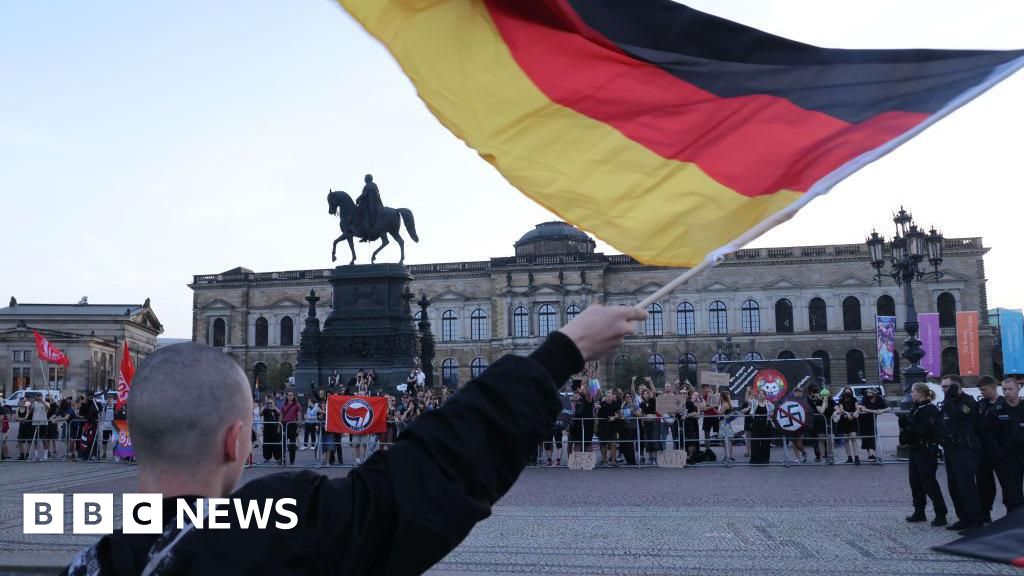
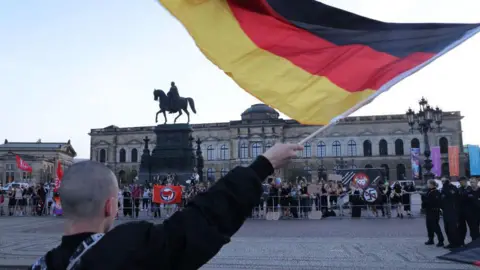 Getty Images
Getty ImagesOn Sunday, voters in the eastern German state of Brandenburg will elect a new regional parliament. The far-right, anti-immigration Alternative for Germany (AfD) party could win a majority. On September 1, the AfD won a major German election for the first time, coming first in the eastern state of Thuringia. In Brandenburg, opinion polls show the AfD leading by 28 percent.
To undermine support for the AfD, Chancellor Olaf Scholz’s left-leaning government on Monday imposed migrant checks at all of Germany’s borders. It also wants to increase deportations of people whose asylum applications are rejected. Meanwhile, the opposition conservatives want to close the borders to asylum seekers altogether.
Germany is very different from the Germany of Angela Merkel. Nearly a decade ago, the then chancellor refused to close the borders to hundreds of thousands of people fleeing war and persecution in Syria and Afghanistan. “We can do it,” she famously declared.
In 2015 and 2016, Germany took in some 1.5 million refugees and migrants, most of them from the Middle East. They were greeted at train stations with “Welcome” signs, and smiling volunteers handed out food and toys. A new German word was invented, “Willkommenskultur,” or “welcome culture,” and suddenly many Germans were proud of the country’s new identity as a safe haven for refugees.
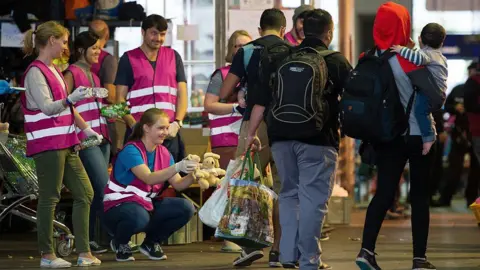 Getty Images
Getty ImagesToday, many of these refugees are Germans. Nearly 200,000 people became German citizens in 2023. The largest group of these came from Syria. These are the new Germans.
Experts describe the “2015 generation” as highly motivated. Many of them could have stayed in Lebanon and Turkey, but they pushed themselves to Germany to start a new life. They are on average younger than the native population – 26 compared to the German average of 47 – and statistically more likely to find work: 84 percent of Syrian men who arrived in 2015 are employed, compared to 81 percent of German-born men.
But with the rise of the Alternative for Germany party, and a harsher tone toward migrants in mainstream politics, the “welcoming culture” of 2015 is hard to find today.
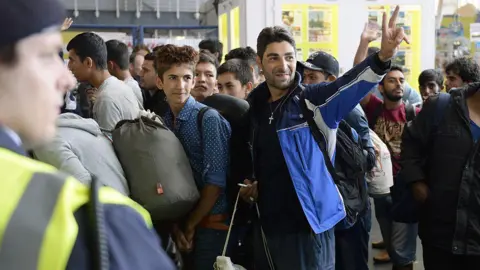 Getty Images
Getty ImagesNow, fewer refugees are coming to Germany, with new arrivals down 22% this year compared to the same period in 2023. But overall, 3.48 million refugees are now living in the country — more than at any time since the 1950s. A third of them are from Ukraine.
Some local councils say they are struggling to cope, both logistically and financially. Right-wingers and the AfD say the numbers are too high. Left-wingers blame the finance ministry’s obsession with balancing the books and its refusal to take on new debt. Add to that the massive increase in military spending after Russia’s full-scale invasion of Ukraine, and Germany is feeling the pinch of cash and resources. Chancellor Olaf Scholz’s fractious and contentious coalition government has not helped voters feel more secure in the country’s leadership.
How do new Germans feel about this shift in mood in Germany?
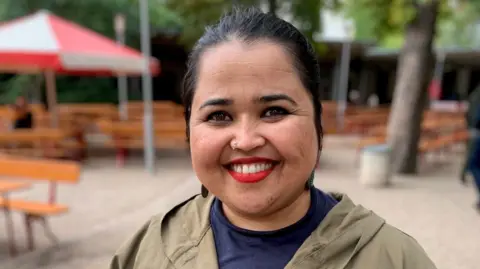
Parvin was one of those who arrived in 2015, travelling for months, mostly on foot, from Afghanistan to Germany with her three-year-old son and disabled nephew. Border guards shot at them and she feared for her life as the overcrowded boat they were on began to sink in the Mediterranean.
She has just been granted German citizenship and qualified this summer as a social worker. You might think this is a refugee success story. But she says the atmosphere for migrants has gotten worse since 2015. “I don’t feel welcome here,” she tells me.
“The rise of the far right and hatred towards refugees is mostly due to the bad image that the German media paints of refugees,” she says. “When a refugee does something bad, the media highlights it a lot. Then people naturally think that all refugees are bad.”
The latest political debate over immigration began in August, after a stabbing in the city of Solingen killed three people. The suspect was a Syrian asylum seeker whom authorities wanted to deport. The following week saw several knife attacks across Germany that did not involve refugees—including two separate stabbings in Berlin in which two women were killed by their ex-partners. These cases did not make headlines.
The far-right Alternative for Germany (AfD) party immediately used the Solingen stabbing incident as part of its campaign for the Thuringia regional election in September. Two hours after the attack, AfD regional leader Björn Höcke, who has been legally classified as a fascist by German courts and fined for using a Nazi slogan at rallies, posted on X’s website “Vote for change in 1.9” alongside the hashtag #Solingen.
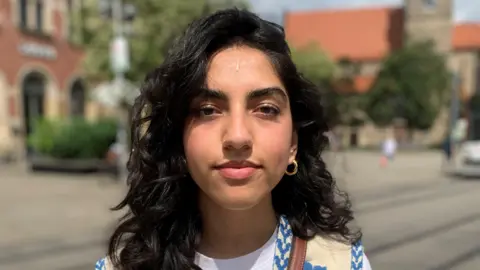
In Erfurt, the capital of Thuringia, I meet Sultana, who is organizing a protest against the far right. She fled to Germany a decade ago from Afghanistan, when she was 10 years old. She is about to start university to study law, speaks German like a native speaker, and is politically active, often addressing large demonstrations. But she cannot vote. She has applied for German citizenship but is still waiting for a response.
Sultana’s mother, Latifa, tells me she is terrified that the family will have to flee again after rebuilding their lives here in Germany. This time to escape the far right.
“We are very afraid and we know that we are under threat. But you have to understand that this has been the reality for years,” says Sultana, adding that the problem is not only the AfD, but the racism that she and many others regularly experience.
“I speak German, I dream in German, and my whole life revolves around being German. I ask myself what more I have to do to be recognized as German,” she tells me, tears filling her eyes.
Sultana believes the solution lies in increasing political activism. “We have no other choice,” she says. “Many immigrants do not have citizenship, so they do not have the right to vote. But we have voices and we want to take these voices to the streets and say: We are here and we will stay here!”
But other new Germans are thinking of leaving altogether. Once she got her German passport, Parvin was finally able to visit her sister in London for the first time in August. Now a qualified social worker, she is even considering moving to the UK. She tells me she has felt much more welcome there.
Last week, DeZIM, a migration think tank, published a study that found that nearly a quarter of people with a migrant background, many of them German citizens, are considering emigrating because of the rise of the far right. Nearly 10 percent of them say they have concrete plans to leave Germany.
The irony here is that the government is trying hard to attract workers to Germany. But the increasingly hostile rhetoric about immigration may not only deter people from coming to Germany, but may also push away new Germans who are already living successful lives here.
Damian’s documentary on the New Germans will be broadcast on the BBC World Service and available to listen to. here.

“Travel specialist. Typical social media scholar. Friend of animals everywhere. Freelance zombie ninja. Twitter buff.”






More Stories
Taiwan is preparing to face strong Typhoon Kung-ri
Israel orders residents of Baalbek, eastern Lebanon, to evacuate
Zelensky: North Korean forces are pushing the war with Russia “beyond the borders”